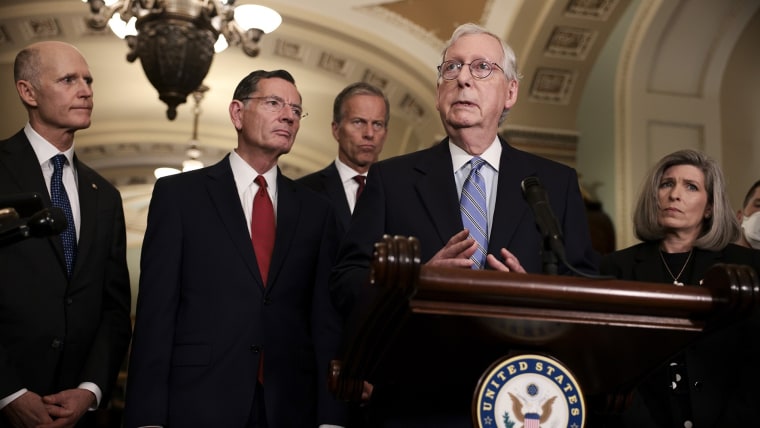The Republican Party's original debt ceiling crisis in 2011 was crushing in a variety of ways, including the unanimity among GOP lawmakers. As the damaging debacle dragged on, observers waited for someone in the party to eventually stand up and say, "Wait, this is wrong; we shouldn't endanger the public this way," but that never happened.
A decade later, the question is whether the party has grown at all. The answer appears to be discouraging.
If Democrats were to draw up a hypothetical list of congressional Republicans who are likely to be sensible about the nation's borrowing authority, they'd probably start with Sen. Mitt Romney. After all, the Utahan's political brand is built around his alleged conservative pragmatism and an understanding of what's best for American businesses, thanks to his private-sector know-how.
If anyone in the GOP understands the importance of dealing with the debt ceiling and preventing the nation's first-ever default, it's Romney. If anyone in the Republican Party could be expected to act like a responsible grown-up about this, it's the party's 2012 presidential nominee. And yet, The Salt Lake Tribune reported overnight:
Sen. Mitt Romney said Tuesday he planned to join the rest of his Republican colleagues in the Senate to filibuster a planned vote on raising the debt ceiling. "We're not voting in any way to help raise the debt ceiling. As a group we are all together," Romney told reporters.
Oh. All right, so Romney's linking arms with those who are responsible for creating this mess, but at least there's Sen. Susan Collins, right? The Maine Republican was around for the 2011 crisis; she saw how damaging it was; and she's exactly the kind of veteran lawmaker who should be willing to show some independence and do the right thing.
And yet, Business Insider had this report on Monday:
Sen. Susan Collins of Maine suggested Senate Republicans could back a debt-limit hike if Democrats abandoned the $3.5 trillion social-spending package containing the bulk of President Joe Biden's economic agenda. On Monday, she told reporters that "some Republicans would vote to raise the debt limit if they knew the Democrats were going to abandon the $3.5 trillion package, which appears unlikely, but that's an agreement that could be reached."
In other words, as Congress' most moderate Republican sees it, GOP senators might consider doing the responsible thing — taking a step Congress has to take anyway — if only Democrats were willing to scrap the White House's popular legislation, which Biden promised voters he'd pursue if elected.
Republican Sen. Lisa Murkowski of Alaska has been a bit more open to the idea of backing away from a self-imposed catastrophe, and yesterday the Alaskan suggested she'd like to see some kind of compromise.
But the fact remains that Democrats have already offered a compromise: Republicans don't have to vote for a debt ceiling measure; they simply have to let Democrats do it on their own by ending a filibuster. So far, Murkowski and her party have rejected this sensible solution.
While the fight appears to be coming to a head — Senate Democratic leaders say they intend to deal with the debt ceiling by the end of this week — the process to date has featured a series of steps in which alleged GOP "centrists" have balked at responsible governance.
For example, when the House voted two weeks ago on a straightforward bill to prevent a shutdown and address the debt ceiling, zero Republicans voted for it. When the Senate considered the same measure, it died because zero Republicans voted against their own party's filibuster.
When the House voted last week on a clean debt ceiling bill, a grand total of one Republican — Illinois' Adam Kinzinger — voted to allow the United States to pay its bills. When the Senate takes up the same measure with a procedural vote today, most expect a similarly partisan outcome.
There's a school of thought that suggests the contemporary Republican Party has a moderate, pragmatic wing, which has no use for the extremist and maximalist tactics of their far-right colleagues, and which Democrats should turn to in order to reach agreements and get important work done.
And yet, the 2021 GOP debt ceiling crisis is offering the same lesson as the 2011 GOP debt ceiling crisis: Those looking for actual Republican moderates on Capitol Hill will be looking for a very long time.

